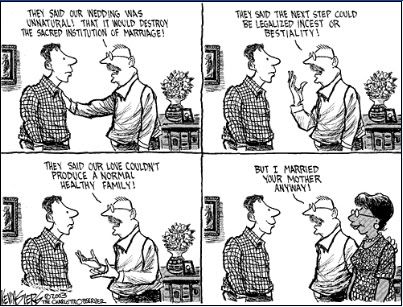
The principle of Cuius regio, eius religio provided for internal religious unity within a state: The religion of the prince became the religion of the state and all its inhabitants. Those inhabitants who could not conform to the prince's religion were allowed to leave, an innovative idea in the 16th century. The phrase cuius regio, eius religio as applied to the outcome is attributed to the early seventeenth century (1612, by the jurist Joachim Stephani (1544-1623) of the University of Greifswald[9]). (via Cuius regio, eius religio: Information from Answers.com).
After war ... peace
All immigrants who do not 'fit in' or who don't 'integrate' into the Danish 'community', it was decided recently, will get an incentive of 100,000 kroner. By the Danish Government, to go back to their home countries. The 'fitting in' and 'integrating' refers to Muslims in Denmark.
The Danes are not alone. The French feel let down because “immigrants were supposed to blend harmoniously into society and not exist in separate communities.”
For centuries, the settled principle in the Desert Bloc was 'Cuius regio, eius religio' (meaning whose land, his religion; CRER) - the ruler decided his people's religion.
After the Fourth Crusade (1202–1204), Vatican invoked the CRER principle ('Cuius regio, eius religio') during its brief rule over the Byzantine Empire to reject religious objections by the Byzantine subjects. Post Hussite Wars and the 'Reformation', establishing the CRER principle to settle Germany, giving rise to the logic of 'ubi unus dominus, ibi una sit religio' (One ruler, one religion). Just in case someone had religious disagreement, the logic was they could well emigrate - (ius emigrandi).
Haiti - and after
The CRER policy guideline was finally abandoned in post-bellum America and Europe after The Haiti Fright. With Haiti breaking loose, when slaves defeated all the major Euro-colonial powers, in battle after battle, slavery was doomed. More than 200 slave rebellions, revolts and conspiracies made slavery in the West impractical. Cuban slaves were the last to win their freedom - which sounded the slavery's death knell.
Western propaganda has made slavery, an invisible factor in their ‘success.’ And they are on the half way mark, on the erasure in popular memory, about the use of colonies for Western enrichment.
Western political constructs
With an acute labour shortage, looming over the West, slavery made way for indentured labour - and America made way for immigrants from all parts of Europe, Japan, China and Philippines.
As immigrants of various colours and beliefs made their way across the world, the CRER principle was relegated into the background.
Added to this was the 1857 War in India, against Christian proselytism, which too had to take a back seat. Victoria Regina's Colonial India Government printed leaflets in tens and thousands to proclaim that the British Crown had no intentions to dictate faith to its Indian 'subjects'. The 1857 War also forced Euro-centric historians to change the entire drift of world history.
Faced with a reality of 'warm-bodies-shortage', 'liberalism', 'secular' Governments, Marxism, Socialism et al were invented in the 19th century. It is this principle which accounts for the low levels of diversity in the West - and which also accounts for the shrillness with which the West proclaims it 'liberalism' - facts being otherwise.
 Melting pot vs Mosaic patterns
Melting pot vs Mosaic patterns
The need for 'integration', the concerns over the slow 'assimilation' of the Mexicans in the American melting pot, the Islamo-phobia, the Compulsive Jihadic Syndrome, are all sides of the same cube. The schizophrenic Christian aggression in India combined with hysterical protests against any backlash are symptoms of the same ideological thread.
While the West talks about the respect for the individual, reality is different.
Members of the Catholic Church note with anxiety (and so does the its replacement, The State) that “the continued insistence that Hispanics will soon pass through the assimilationist melting pot and be American like us is not only false, but also harmful for our Hispanic sisters and brothers, and thus for the church”.
Another study to measure ‘assimilation’ notes “Mexican immigrants are assimilating more slowly than Italian immigrants did at the turn of the last century”. Similarly, expatriate populations in the Middle East have to live with disrespect and intolerance of non-Islamic religions.
Lowest diversity vs. Biggest talk
The West today has the lowest levels of ethnic, linguistic and religious diversity – and persecutes whatever little is left, like the Roma Gypsies for example. Would critics like to mention any other country, where such a large minority Muslim population, has greater freedom and opportunity, than in India? Would you like to suggest France instead?
 The language conundrum
The language conundrum
India, has 15 official languages.
No other countries even had the courage to think of that. Various US state governments outlawed all languages – except English. It was only in 1923, was this finally set aside after the matter reached the US Supreme Court (read Meyer vs Nebraska). The USA gathered some courage to start timidly with more than English only after seeing India’s success with 15 languages. Switzerland has only four. Sri Lanka’s Sinhalas do not want to accept Sri Lankan Tamils as full and equal citizens – hence the 20 year old civil war.In the thrall of One
 The Western concept of nation building requires the cornerstones of Desert Bloc – One God, One Book, One Holy Day, One Prophet (Messiah), One Race, One People, One Country, One Authority, One Law, One Currency, One Set of Festivals. This tyranny of the ‘One’ is the root of most problems in the world. From this ‘Oneness’, we get the ‘One’ Currency, ‘One’ Language logic – a fallacious syllogism. Once you accept ‘One’, you will accept all others.
The Western concept of nation building requires the cornerstones of Desert Bloc – One God, One Book, One Holy Day, One Prophet (Messiah), One Race, One People, One Country, One Authority, One Law, One Currency, One Set of Festivals. This tyranny of the ‘One’ is the root of most problems in the world. From this ‘Oneness’, we get the ‘One’ Currency, ‘One’ Language logic – a fallacious syllogism. Once you accept ‘One’, you will accept all others.

The Indic model
Unlike the Indian social system, where differences are respected and encouraged, the position of the French Government, paraphrases the thinking of the ‘desert bloc’. Indians believe that all are वासुदेवाय कुटुम्बकम ‘vasudevaih kutumbakam’ and ईसा वास्यो मिदं सर्वं ‘isa vaasyo midam sarvam’ (meaning we are all God’s family and God is in everyone and everywhere respectively).
No comments:
Post a Comment